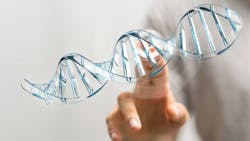DNA replication and repair happens thousands of times a day in the human body and most of the time, people don’t notice when things go wrong thanks to the work of Replication protein A (RPA), the ‘guardian of the genome.’
Scientists previously believed this protein ‘hero’ responsible for repairing damaged DNA in human cells worked alone, but a new study by Penn State College of Medicine researchers showed that RPA works with an ally called the WAS protein (WASp) to ‘save the day’ and prevent potential cancers from developing.
The researchers discovered these findings after observing that patients with Wiskott-Aldrich syndrome (WAS) — a genetic disorder that causes a deficiency of WASp — not only had suppressed immune system function, but in some cases, also developed cancer.
Dr. Yatin Vyas, professor and chair of the Department of Pediatrics at Penn State College of Medicine and pediatrician-in-chief at Penn State Health Children’s Hospital, conducted prior research which revealed that WASp functions within an apparatus that is designed to prevent cancer formation. As a result, some cancer patients had tumor cells with a WASp gene mutation. These observations led him to hypothesize that WASp might play a direct role in DNA damage repair.
The researchers conducted protein-protein binding experiments with purified human WASp and RPA and discovered that WASp forms a complex with RPA. Further tests revealed that WASp ‘directs’ RPA to the site where single DNA strands are broken and need to be repaired. According to Vyas, without the complex, DNA repair happens by secondary mechanisms, which can lead to cancer. This novel function of WASp is conserved through evolution, from yeast to humans. The results of the study were published in Nature Communications.

